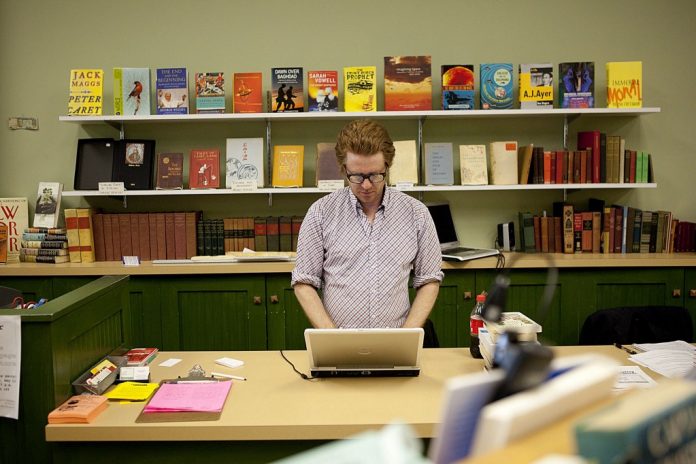Jonathan Sipes, manager at The Next Page on 722 Chestnut St., looks up the value of books online.
Kevin Cook/for the Times
Amy Dougherty and Jonathan Sipes have a simple message for those who lament the extinction of independent, mom-and-pop-style bookstores:
Don’t believe everything you read.
Often considered a dying breed in an economy fixated on “big box” chains like Borders and Barnes & Noble, along with online retailers like Amazon.com, smaller bookstores are actually re-emerging in the marketplace, say Dougherty, the executive director of the Friends of the Free Library of Philadelphia, and Sipes, who manages two bookstores for the non-profit Friends group.
The independents may not be as prevalent as they once were, but Dougherty and Sipes can name about a dozen of them in the city.
Last week, the Friends group celebrated the first anniversary of the opening of its second store, The Next Page, at 722 Chestnut St. Though the shop’s business model is different than one would expect to find at a for-profit retailer, public interest in The Next Page demonstrates that a demand still exists for independent, neighborhood-based booksellers.
“We think that big boxes are closing up for a variety of reasons, and the independents are making a comeback,” Dougherty said.
“The mom-and-pop model is more viable than it was three to four years ago,” added Sipes, a Baltimore native who previously worked at one of the big-box booksellers.
Founded in 1973, the Friends of the Free Library of Philadelphia advocates for the city’s public libraries through affiliate volunteer groups at 50 of the city’s 53 library branches. The groups serve as liaisons between libraries and the public at large.
The Friends opened its first store, The Book Corner, at 311 N. 20th St., in the shadow of the Central Library, in 1991. The Book Corner has about 120 titles in stock, while The Next Page has about 70,000.
Both locations primarily sell pre-owned books. The locations suit the Friends group’s mission for several reasons, according to Dougherty.
“They’re the public face of the Friends of the Free Library; they put used books in the hands of new people; they provide a little bit of money; and they service book lovers and enable them to recycle books,” she explained. “We’ve probably recycled half-a-million books into the hands of new people, between the two stores.”
The stores get most of their inventory through private donations. The stores don’t generally sell former library books.
“The books that are donated to us are from book lovers who would love to get them back into the hands of readers who will love them as much as they did,” Dougherty said.
The Book Corner is the “bargain store,” with all books priced at $3 or less. Books at The Next Page sell for about one-quarter to one-third of the original list prices.
Despite the discounts, customers can expect to get a high level of personal and personable service.
“Different types of neighborhoods want different types of bookstores,” Sipes said. “At (the Chestnut Street) location, I’m dealing with a lot of people who commute to and from work. People want to be able to come in and out very quickly. At the other store, more people are day-tripping and they have more time to spend looking for gems.”
Though big chain stores offer more titles and newer ones, they generally can’t cater to specific clienteles because of a “cookie-cutter” business model, he believes.
“They’re wonderful at what they do, providing a huge selection, but they’re the same from neighborhood to neighborhood. And with an organization that size, you can’t really respond to customers at (the ground) level,” Sipes said.
Having observed his own customers’ buying behavior, the store manager has determined that there is a high demand at The Next Page for art and architecture books, biographies and books of local interest. So that’s what he displays in the front of the store.
Two-thirds of the shop is dedicated to non-fiction. The fiction section is at the rear.
While sales figures at The Next Page aren’t yet at the level that the proprietors would like, they remain confident that a large segment of the public still values reading in book form and will drive the regrowth of independent bookstores.
“The world is changing, but I think there are a lot of people who still want to hold a book,” Dougherty said. “I prefer it, and a lot of people prefer it.” ••
For information about The Next Page, The Book Corner and the Friends of the Free Library of Philadelphia, visit www.libraryfriends.info
Reporter William Kenny can be reached at 215–354–3031 or [email protected]





